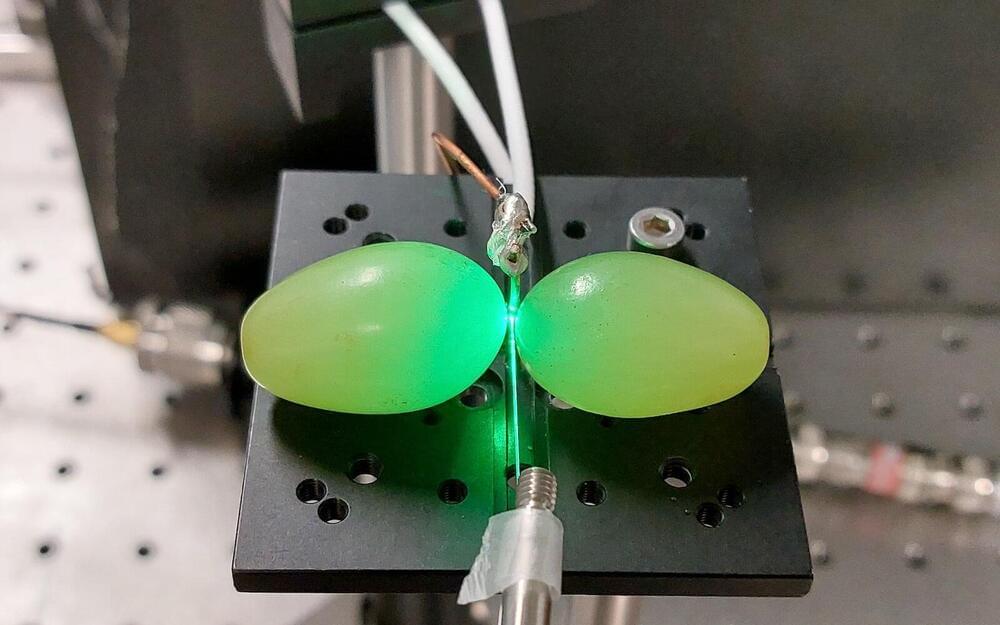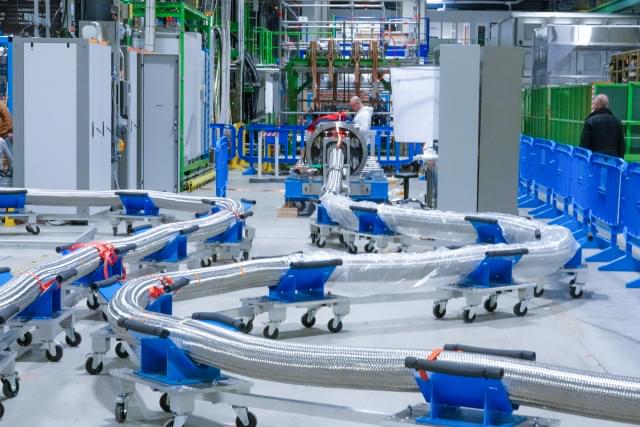Lava is bubbling through the crust of one of the world’s most active volcanoes, which is Kilauea, on Hawaii’s Big Island.



Macquarie University researchers have demonstrated how ordinary supermarket grapes can enhance the performance of quantum sensors, potentially leading to more efficient quantum technologies.
The study, published in Physical Review Applied on 20 December 2024, shows that pairs of grapes can create strong localized magnetic field hotspots of microwaves which are used in quantum sensing applications—a finding that could help develop more compact and cost-effective quantum devices.
“While previous studies looked at the electrical fields causing the plasma effect, we showed that grape pairs can also enhance magnetic fields, which are crucial for quantum sensing applications,” says lead author Ali Fawaz, a quantum physics Ph.D. candidate at Macquarie University.

The Large Hadron Collider (LHC), the world’s largest and most powerful particle accelerator, is also the largest single machine operating in the world today that uses superconductivity. The proton beams inside the LHC are bent and focused around the accelerator ring using superconducting electromagnets. These electromagnets are built from coils, made of niobium–titanium (Nb–Ti) cables, that have to operate at a temperature colder than that of outer space in order to be superconducting. This allows the current to flow without any resistance or loss of energy. The High-Luminosity LHC (HL-LHC), an upgrade of the LHC, will for the first time feature innovative electrical transfer lines known as the “Superconducting Links”
Recently, CERN’s SM18 magnet test facility witnessed the successful integration of the first series of magnesium diboride superconducting cables into a novel, flexible cryostat. Together with high-temperature superconducting (HTS) magnesium diboride (MgB2) cables, they will form a unique superconducting transfer line to power the HL-LHC inner triplet magnets. The triplets are the focusing magnets that focus the beam, right before collisions, to a diameter as narrow as 5 micrometres.
Bioconvergence — Bridging Science And Nature To Shape Tomorrow — Dr. Nina Siragusa Ph.D. — Merck KGaA, Darmstadt, Germany
#NinaSiragusa #MerckGroup #Darmstadt.
Dr. Nina Siragusa, Ph.D., MBA, is the Strategy, Business, and Data & Digital Lead within the global R&D organization of Merck Healthcare KGaA, Darmstadt, Germany. In this role, she leads strategic projects, manages business operations, and drives digital transformation.
Previously, she served as Chief of Staff to Dr. Laura Matz, Chief Science and Technology Officer at Merck KGaA, Darmstadt, Germany. As part of the Science and Technology Office Leadership Team, she was responsible for fostering cross-sectoral collaboration, innovation, and digitalization across Merck’s three business sectors. She also spearheaded the company’s efforts in Bioconvergence, a multidisciplinary approach that synergizes biology, engineering, data, and digitalization. This initiative promises groundbreaking advancements in healthcare and the life sciences, heralding a new era of scientific collaboration for a healthier, more sustainable future.
Prior to that, Dr. Siragusa contributed to corporate innovation in several leadership roles:

NASA’s Parker Solar Probe is set to achieve its most dangerous feat yet tomorrow, December 24, 2024. After a six-year journey of spiraling closer to the star at the heart of our solar system, the spacecraft is expected to come within 3.8 million miles of the Sun’s surface.
This tiny distance in cosmic terms lets scientists capture a new type of information, revealing secrets about solar winds, extreme heat, and magnetic fields.
Engineers have spent years carefully adjusting Parker’s flight path using multiple Venus gravity assists. These flybys reshape the spacecraft’s orbit and tighten its looping path around the Sun.

Showing how far AI engineering has come, a new aerospike engine burning oxygen and kerosene capable of 1,100 lb (5,000 N) of thrust has successfully been hot-fired for 11 seconds. It was designed from front to back using an advanced Large Computational Engineering Model.
Designing and developing advanced aerospace engines is generally a complicated affair taking years of modeling, testing, revision, prototyping, rinsing and repeating. With their ability to discern patterns, carry out complex analysis, create virtual prototypes, and run models thousands of times, engineering AIs are altering the aerospace industry in some surprising ways – provided, of course, they are properly programmed and trained.
Otherwise, it’s garbage in, garbage out, which has been the Golden Rule of computers since they ran on radio valves and electromechanical relays.


One used AI to dream up a universe of potential CRISPR gene editors. Inspired by large language models—like those that gave birth to ChatGPT—the AI model in the study eventually designed a gene editing system as accurate as existing CRISPR-based tools when tested on cells. Another AI designed circle-shaped proteins that reliably turned stem cells into different blood vessel cell types. Other AI-generated proteins directed protein “junk” into the lysosome, a waste treatment blob filled with acid inside cells that keeps them neat and tidy.
Outside of medicine, AI designed mineral-forming proteins that, if integrated into aquatic microbes, could potentially soak up excess carbon and transform it into limestone. While still early, the technology could tackle climate change with a carbon sink that lasts millions of years.
It seems imagination is the only limit to AI-based protein design. But there are still a few cases that AI can’t yet fully handle. Nature has a comprehensive list, but these stand out.

Linköping University’s experiment confirms a key theoretical link between quantum mechanics and information theory, highlighting future implications for quantum technology and secure communication.
Researchers at Linköping University and their collaborators have successfully confirmed a decade-old theory linking the complementarity principle—a fundamental concept in quantum mechanics—with information theory. Their study, published in the journal Science Advances, provides valuable insights for understanding future quantum communication, metrology, and cryptography.
“Our results have no clear or direct application right now. It’s basic research that lays the foundation for future technologies in quantum information and quantum computers. There’s enormous potential for completely new discoveries in many different research fields,” says Guilherme B Xavier, researcher in quantum communication at Linköping University, Sweden.

Researchers at Flinders University have developed a low-cost, high-density polymer that can store data efficiently using nanoscale indents and can be erased and reused multiple times.
This innovative material, made from sulfur and dicyclopentadiene, promises greater storage capacities compared to traditional storage devices, and its ability to be quickly recycled offers a sustainable alternative for the future of data storage.
Innovative Data Storage Material